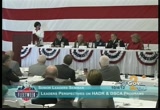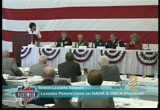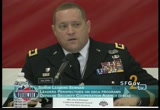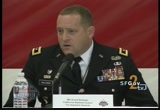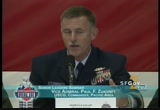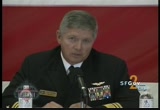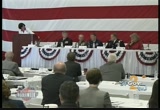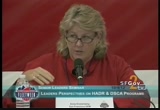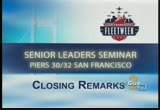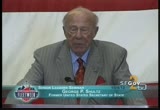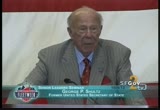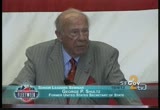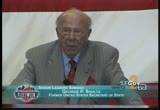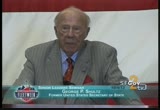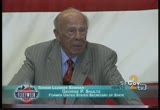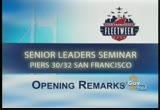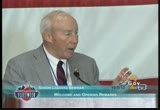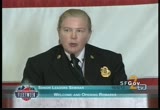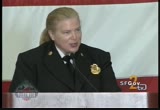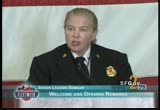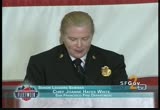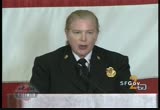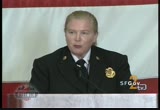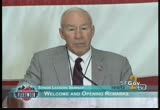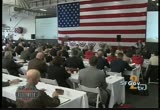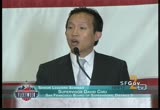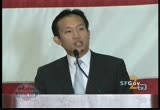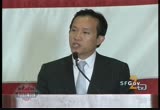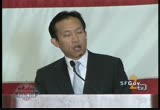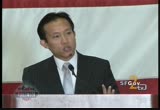tv [untitled] October 21, 2012 6:30am-7:00am PDT
6:30 am
>> i think one of the things that was a revelation this year, as we've had a chance to do more, i think there is a discovery of how much more really needs to be done. i'm not sure if we quite know yet collectively what we do not yet know in terms of what will be necessary to have an effective response. the comments that we have and the work that we've done over the last couple of months of putting the pieces together just get the lcac ashore, the helicopterses in to conduct an exercise up here last summer reveals that there's a lot more work that needs to be done if this is to be smooth. it's complex. it's hard. frankly, the military piece is going to be relatively easy. we'll be able to sort for ourselves relatively fast because we've got a pretty good sight picture on who we are and
6:31 am
what we are w dough and how we fit together. i think one of the real challenges, my observation, is civil authorities getting a full grip on everything that's going to be necessary to put together a sound response at the local level, and then herding all the cats that are in this pretty complex environment and trying to get them moving in a common direction. >> general baldwin? >> first, i'm very, very encouraged at the direction the department of defense has taken in changing the way that we do support the civil authorities. and the evolution, the problem that came out of the l.a. riots that were highlighted during hurricane katrina, we had two milltrix out there, the active force and responding. with changes in the law and changes in focus and direction we're starting to fix a lot of that and come together as one joint team to be able to better serve the people here in the state of california and the rest the nation in times of
6:32 am
disaster. but there is work that needs to be done. first, we need to find a way that we can share capabilities that are resident within each of our organizations. as the commander of the army national guard you would think i know what forces are available in the army reserve in california. but i don't. i don't even know who their general officers are. i have no visibility on what forces are available at camp pendleton depending on your deployment cycle what fleet week can bring to bear. and we need to find a way, perhaps dcl, north palm being the broker of that, to maintain a better capabilities database so we know what is immediately available because under our old constructs, if we needed additional help in the national guard in california, we would go to the national guard from other states and that may be 1500 miles away. and that capability could be right down the road or down in san diego in one of the reserve components or in the active components of the marines or the navy and we need to sort through that so we can better
6:33 am
respond. with that also will come changes that may need to be statutory changes so we can better accept the title 10 forces in particular the reserve forces. it is very frustrating during fire season when our black hawk helicopter company flying its rotors off down in los alamedos is sitting on the same ramp as army reserve helicopters we can't access because of staff problems and other issues we're going to have to work through to fight those same fires, those are the kind of things we'll probably have to take back to our elected leadership and change -- make some changes to be able to better serve the people. >> i was at chief sur, and i was glad to hear him say that we really rely on the communities to be their responder for the first 72 hours. this topic of community resiliency is played out in the highest level of government. certainly when i traveled with craig fugate doing national
6:34 am
services, the earthquake last year, they get it during an exercise environment, but how is that going to differ from reality? but it's permeating down to the local level now. and the next challenge is how do we cross that bridge to truly having community resiliency? how do we leverage faith-based and nongovernmental organizations to carry that message for local, state, and federal leaders? so, i think that's the next challenge going forward. but the messages being delivered from the top down, i think the next piece is how do you now move it horizontally across the community level. >> and in closing, i'm going to go down the panel and ask if there's any closing comments or points that you haven't had the opportunity to make. i think, you know, people are anxious to hear your thoughts on this particular program and on this mission because it is going to take all of us if the big one happens. so, if i can start with you, vice admiral beaman, if there
6:35 am
is anything you'd like to impart, sir. >> actually, i have 37 things i'd like to talk about, but knowing we are the last thing between you and the refreshments in the back, i'll limit it to one. and michelle gedess brought it up earlier today. it's been characterized a couple different ways. vice admiral breckenridge asked if there are any gaps that we've discovered. i would say in a denied environment, it's something we in the military are looking and training to on a daily basis. but in terms of communications, in a denied environment -- and it's not through any particular act that's denying us other than whatever destruction is a resultant of the disaster that hit. and i think that's where we really have work to do. i think next year's table top exercise, if it addressed that or the drill itself went after that, i think we would stand to
6:36 am
learn a lot. some of it wouldn't be pleasant, but better to learn it now than in the event something has happened. and thank you very much. >> thank you, sir. >> this is my third fleet week. the trajectory is right, and we really need to keep it going. and look forward to putting the pieces together for next year. >> i'll just echo those sentiments and let's hope that history is not a teacher because on october 17th, 1989 at 5:04 p.m., during the world series between the oakland athletics and the san francisco giants, that's when that one hit at 7.1 and then oakland went on to sweep 4 games to none. >> we are very pleased to be invited to participate this year. this is the first year the
6:37 am
california national guard has participated in any substantial way in fleet week. i know we have only a very, very tiny fleet between our army forces and our air forces. we do have a couple of vessels. we are looking forward to continuing to participate and doing yet more to support this and the work with our inter agency partners. >> we in the san francisco bay area region will continue to work with our local partners, with our state partners, cal ema, the national guard, with our federal partners fema, the national park service, and with all of our military partners to, you know, really work on being prepared and ready for anything in the bay area region. and i'm confident that with the relationships we're building, that we will be prepared when the time comes. thank you. >> thank you to the panel for all of their insights. (applause)
6:38 am
>> big hand for the panel, that was great. and if i could ask the panel to stay where you are, jody, if you would sit down. i want to bring the closing remarks, i want to bring up former secretary of state george schultz. >> for closing remarks, want to bring up secretary of state george schultz. if you could help on this end. >> that was a great panel. thank you all. >> well, we've had quite a display. we've had a lot of area planning, filled with op exercises. we had the ocean beach
6:39 am
yesterday. the military made something difficult look easy. it was a display of competence. and it gives us confidence that not only is the military going to help us if we have a problem here, but the military is able to do its job of protecting our national security with confidence. it's wonderful to see confidence on display. i was asking myself as i listened to the panel today and i'm working with mike and leslie on the program, what kind of words would describe what we're doing? well, certainly impressive is one. reassuring is one, that we see what's going on, the planning, the capabilities. i think another is to underline
6:40 am
the importance and then this panel in particular they underline t the importance of looking on this as a building operation. each year has been a little better than the year before or different. if that's been iterative or a plus [speaker not understood]. somebody asked if we could keep this going. may i remind you it's been going for 31 years. we've had this last two years that have been the most impressive iteration, but it's been going for a long while. let me try to sort of summarize it by using an image. how many of you have looked closely at the great seal of our republic? if you look closely you'll see that the center piece is an eagle. the eagle holds an olive branch
6:41 am
to show that united states will always seek peace. let me say not only peace, but the united states will always seek solutions to problems. we're a pragmatic people that like to have a problem [speaker not understood] and do something about it. and the other talon the eagle holds arrows to show that the united states understands that if you're going to be successful and effective in seeking peace, you must be strong. and i would say strong, and i'll use that word a little bit more loosely and say competent. you must be able to do things. so, if you take that image and you have objectives on the one talon and capability on the other, and you marry them
6:42 am
together, that's what we in the united states have been doing, particularly since the end of world war ii. then there we were having propelled the three worlds to victory. the other of us having seen we had an aggressive adversary on our hands and looking back what a horrible last century or so, we had to do better. and we did it by this iteration of objectives and capabilities. and we put together what has amounted to a global economic and security commons from which we all have benefited and continue to benefit. [speaker not understood]. so, we have to keep working at it. and i think the things that have been talked about here are very much in the line of keeping
6:43 am
[speaker not understood]. niche a was mentioned this morning. that was a fantastic piece of work by the navy. it turned around the attitudes of niche a toward the united states. it was a the kind of building block we look for in an economic and security commons. just as when we in san francisco see not only what the military can bring to the party and help us with, not only how we can interact with the military, but also we say to ourselves, it's also up to us to do everything we can for ourselves. we're not kind of an outfit, it's easier for them to collaborate with us.
6:44 am
so, all of these things are important to us as we have these exercises. so, i say this is a very worthwhile enterprise that will keep going. i tip my hat to my friend mike who really has been leading us in these efforts. and now i say as also the slogan, i guess you call it this morning, maybe it's what the navy says. i think it's a very good phrase. a global force for good. that's what we've been practicing, a global force for good. thank you. (applause) >> thank you, sir. thank you. thank you very much, sir. (applause) >> and for all of you, tomorrow
6:45 am
we're going to have the former secretary defense william perry speak. and the final speaker tomorrow will be the commander of north com, it will be the first time the northern command... >> ladies and gentlemen, welcome to day two of the senior leader seminar for san francisco fleet week 2012. we had a great day yesterday and we're going to have an even greater day today. we've got a number of people that i would like to bring up to welcome you all. while this senior leader seminar is going on, there's a number of other activities that are going on at the same time.
6:46 am
and a very important activity is some training that's taking place on treasure island. it's training by the san francisco fire department and it's become a huge hit with the marines and the sailors that are able to get this training. with that, i'd like to have our police chief -- fire chief from san francisco, chief hayes white, come forth and talk to you about some of these events and the fire department's role. thank you. >> thank you, thank you very much. thank you, general. good morning, everyone. welcome to san francisco. this is day two of the senior leaders seminar. i had the opportunity to sit through most of the seminar yesterday. i found it very informative, and would certainly like to again echo our thanks and appreciation to admiral beaman and captain pringle on the
6:47 am
beautiful uss macon island. if we could give applause to all the men and women serving on this ship, thank you for your hospitality. (applause) >> this is a week where we highlight and celebrate all the sacrifices that military personnel make. in the san francisco fire department, we work 24/7 shifts. we're considered para military, but we recognize in the military the great sacrifices that you make each and every day to protect our freedom while being away from your homes and your family. so, thank you very much. it's an honor to welcome you to san francisco. (applause) >> i'd also like to acknowledge the presence of two people that i consider honored to call friends, and they continue to be treasures to san francisco, to our city, to our state, and
6:48 am
to our nation. and i was so impressed yesterday that both of them intently sat here yesterday taking it all in. and it was the highlight really i think of the seminar to have the evening closing remarks capped off by former secretary of state george schultz. so, thank you very much, sir, for being here. (applause) >> it is a wonderful partnership that he shares with his wife who is chief of protocol for our city and our state, charlotte schultz. so, thank you very much. (applause) >> certainly this partnership couldn't take place without all of the heavy lifting and hard work done by the san francisco fleet week association. so, thank you to general myatt for your vision. this is your three of not only the celebration events, but what you spoke to earlier. also the executive director of the fleet week association lewis lubin. thank you very much. (applause) >> i've had the pleasure of
6:49 am
serving in the san francisco fire department for 22 years. it will benign years in nine since i stepped up and took the role of chief of the department. i continue to be proud of that. and i can say which i said earlier in the week, the coordination and the collaboration only gets better each year that we do this. and i'd also like to acknowledge the department of emergency management and all of her staff for coordinating so seamlessly with the fleet week association in addition to all of the other events that we have that's going on this week. so, thank you to our department of emergency management. (applause) >> as we discussed, it is so important to not only build relationships, but to strengthen them. and that is exactly what we're doing here this week. i'm also very proud that the fleet week association has once again included our community partners. as you know, in 1989 there was the loma prieto earthquake.
6:50 am
we had many show up and go to work. we realized we were quickly overwhelmed and had limited resources. after loma-prieta was an educational piece to partner with our community. and the fleet week association has invite and had there are so many of them here, i'm very proud of our neighborhood emergency response team training folks that are here today. my hat is off to you because we couldn't do it without your dead gaytion -- dedication and volunteerism. so, thank you to our nert members here today. (applause) >> and i'm so proud to continue to be partnering with our military personnel when it comes to humantarian assistance and disaster relief. i was literally in awe on wednesday on ocean beach with the landing of the lcac and also to take a look at the capabilities and the resources that we would have available to us in the event of a large-scale emergency. my hat is off to all of you with just how well you've planned, your multitude
6:51 am
capabilities, and as secretary schultz said i'll take a note from his confidence of display. to see how you set up in an hour a field hospital to take care of patients, not run of the mill patients, but critically wounded patients. we were so impressed. i think a couple other words the secretary used were impressive and reassuring. that's what it's about, forming partnerships. so, i'm very proud to be not only to be honoring and celebrating our military, but to be partnering once again in cross training. happy to report that a little later today aboard the uss macon, we're learning the best. firefighting below the deck, members on the flight deck learning about aircraft rescue, firefighting. similarly, and i won't be able to stay the whole day today because soon i'll be headed over to treasure island, a
6:52 am
former navy firefighting school, we'll have that facility about 14 years and we'll be welcoming 40 members from the u.s. marine corps, 20 members from the u.s. navy, 10 members the u.s. coast guard, where we will then partner with them and cross train them and use our techniques, reaching technical rescue and high and low rescue being demonstrated in display. we will also be having some of our u.s. navy personnel on ride-alongs with members on our ambulances, fire engines and trucks to continue with our cross training. so, it gives me great pride to be here to continue to serve as the fire chief, to welcome the military, and to say thank you to all of you. here's to an enjoyable fun-filled busy weekend. all the best, and thank you for your service. (applause) >> i wanted chief to tell you about that training. we first did it in 2010, search
6:53 am
and rescue which we knew was a problem in haiti in the earth wake in the recovery. and like they say in san francisco, the fire department, we know how to do it, but when the big earthquake hits, we're all going to be victims and we want to make sure that anybody that potentially could come in to help dig us out knows how to do it. well, we trained some marines and petty officers in 2010 and as fortune would have it, i think u.s. s. reagan was in japan after their earthquake, there were a couple petty officers who had undergone that training were sent ashore in japan to assist in some of the urban search and rescue training. so, it was real world application. before i bring the next welcomer up, i have some administrative remarks. there are rest rooms here. and today i want to make sure you know it's back behind those screens for people that weren't
6:54 am
here yesterday. and, of course, there's coffee there. this is a busy week and a busy weekend, and it's a core i -- choreography with all the ship movements. i can't let it go further without thanking monique moyer for what she and her folks have done to make this such a wonderful fleet week. (applause) >> our next welcomer, and this has really been exciting for me because i didn't think it would happen, but it came last year and he's become a great supporter and he happens to be the supervisor where most of the activities are taking place in the city. but he's also the president of the board of supervisors. i'd like you to welcome david chiu. (applause)
6:55 am
>> glad to have you here. >> glad to be here. good morning. on behalf of the san francisco legislative body, our board of supervisors, i want to welcome you to our city of san francisco. and i first want to also echo what our fire chief just said as far as welcoming all of you who have been serving our country and the world in uniform. i want to thank those of you who helped to run our first responder departments around the bay area. i want to thank those of you who are our volunteers, our note programs here. and of course want to thank and welcome our san francisco secretary of state and the woman who manages and orders around that secretary of state, charles m. charlotte schultz. (applause) >> now, this week as you know, there is a lot going on here. and in addition to welcoming you here at the scenier leader seminar, i want to tell you we were so excited that the sls would be here that we decided
6:56 am
this weekend to also require the americas cup to celebrate -- to require the san francisco giants to have a play off game, the 49ers to play this weekend, the blue grass festival to be here, the parade, as well as the castro sea fair to coincide and welcome you in style. but i wanted to say a few words about the one thing that keeps me up as the head of the legislative body here in san francisco. the reason why i sit with many of our first responders on our city's disaster council, the reason why a few years ago chief white and i led almost a half a billion dollar bond campaign to rebuild the water, fire, and police infrastructure. about every six months i literally wake up in the middle of the night thinking about what would happen if a disaster struck our city. and i think about this and i think i have these nightmares
6:57 am
really for three reasons. one, everyone who lives in san francisco knows that in 1906 we were hit not just by an earthquake, but by an earthquake that led to a fire that burned down literally every single neighborhood in the district that i currently represent in the northeast part of san francisco. another reason why i wake up in the middle of the night, though, has to do with an experience i had 7 years ago in 2005, which i think i might have shared with some of you here on this ship today. in november of 2005 i was asked when i was running a technology company before i joined the board of supervisors to show up at the city of the site of a client. that city was new orleans. this was a few weeks after hurricane katrina, which we all know will be probably the greatest civil engineering set of blunders that our country has made in our country's history.
6:58 am
and what we all learn from hurricane katrina is what happens when we don't have a community that is prepared and a set of relationships that is ready to be hit by the big one. which leads me to the third reason why i wake up at night. the neighborhoods that i represent in the northeast not only represent the oldest neighborhoods in our city, but some of the most vulnerable. we have some of the poorest residents. half of my district are recent immigrants who are mono lingual. i have hundreds of constituents who live in buildings that contain them where they live three, four, five people in a room that might be no larger than 10 by 15 feet, in buildings that are absolutely prone to earthquake, fire, and the next major disaster. and, so, i was asked to just mention if i had three things that i want you to tell us as your civilian leaders.
6:59 am
the first has to do with how to deal with community shock. two nights ago as a couple of you commented, you may be wondering why i have a bandage on my hand and i look like i got into a fight at a bar. i happened to spend a couple hours in one of our city's finest emergency rooms after a minor bike accident. and it is minor, no broken bones, i'm fine. but what is interesting to me in my experience of getting knocked off my bike was that for about an hour or two after the accident, my body was shaking uncontrollably. i was experiencing what i later learned on wikipedia was the phenomenon known as shock. and we know as a community that when the next disaster hits us, not if, but when, our community will go into shock. in fact, we market this in our local efforts as the 72 hours. the 72 hours that hits any community, when w
195 Views
IN COLLECTIONS
SFGTV2: San Francisco Government Television Television Archive
Television Archive  Television Archive News Search Service
Television Archive News Search Service 
Uploaded by TV Archive on

 Live Music Archive
Live Music Archive Librivox Free Audio
Librivox Free Audio Metropolitan Museum
Metropolitan Museum Cleveland Museum of Art
Cleveland Museum of Art Internet Arcade
Internet Arcade Console Living Room
Console Living Room Books to Borrow
Books to Borrow Open Library
Open Library TV News
TV News Understanding 9/11
Understanding 9/11